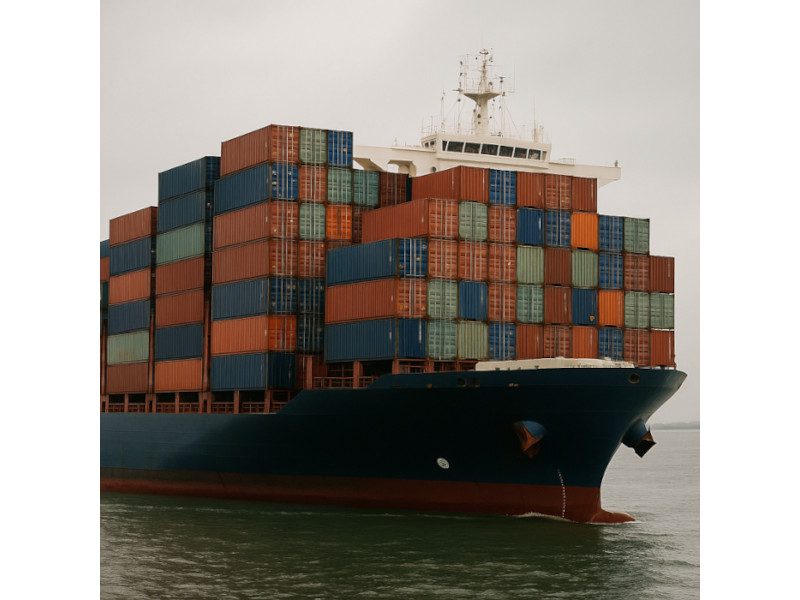Greg Pradervand, Co-Founder and Chief Revenue Officer at Havona Technology Ltd, explains how innovation is at the heart of creating comprehensive digital trade solutions
Please begin by explaining what Havona Technology does and a bit about its history…
Havona Technology is an innovative company that is revolutionising global trade through digital solutions. We are currently building a global digital trade network that is specifically designed for the complexities of physical commodity trade. Our solution leverages various cutting-edge technologies with the aims to tackle the inefficiencies
Please begin by explaining what Havona Technology does and a bit about its history?
Havona Technology is an innovative company that is revolutionising global trade through digital solutions. We are currently building a global digital trade network that is specifically designed for the complexities of physical commodity trade. Our solution leverages various cutting-edge technologies with the aims to tackle the inefficiencies and frictions inherent in traditional paper-based trade processes, empowering businesses with greater trust, transparency, and access to trade finance.
Havona’s origin stems from witnessing, firsthand, inefficiencies and fraud in physical commodity trading. The traditional paper-based trade ecosystem is burdened by delays, errors, and lack of visibility, hindering the efficient flow of goods and impeding economic growth. Motivated by the need for change, we undertook a mission to create a comprehensive digital trade solution that would simplify trade operations and create new opportunities for businesses globally.
Could you explain how innovation has played an integral role in the development of your products/services?
Innovation has been crucial in the development of our digital trade platform. Our team continuously seeks and implements the latest technologies to improve our solution and provide exceptional value to our clients.
One of the ways in which innovation has driven our product development is through:
Blockchain Technology and Cryptography: Blockchain’s immutability and traceability, combined with cryptographic keys, ensure that all trade data is tamper-proof and verifiable. This fosters trust and efficiency among all participants.
Use of Electronic Transferable Records (ETRs): Digital representations of traditional paper documents, to streamline the trade process and reduce inefficiencies.
Machine Learning and Artificial Intelligence (AI): Integrating machine learning and AI into our platform to automate tasks, improve data analysis, and enhance risk management.
Leveraging cloud-based infrastructure: Ensuring scalability, reliability, and security. This approach allows us to seamlessly expand our capacity to meet growing demands and accommodate new features.
Collaborations: Collaborating with industry partners, government organisations, and non-profit organisations allows us to develop innovative solutions by bringing together diverse perspectives and expertise to tackle complex problems.
What were some of the challenges faced when trying to create such a comprehensive solution to cover each phase of a physical commodity transaction, and how did the Havona Technology team overcome these challenges?
Our team’s expertise in physical commodity supply chain, trade finance, blockchain technology, and enterprise software development was invaluable in overcoming these challenges. We approached each challenge collaboratively and innovatively, engaging with key industry stakeholders to gain valuable insights and ensure our platform aligned with industry best practices and needs.
Developing a digital trade solution for physical commodity transactions was a challenging task and included the following areas:
Balance complexity with user-friendliness: ensuring that the platform was sophisticated yet intuitive. Maintaining data integrity and accuracy was also paramount due to the transfer of sensitive information. We implemented strong data security protocols and advanced data validation techniques to address this challenge.
Scalability: to support the increasing volume of trade transactions and participants. To achieve this, we invested in cloud-based infrastructure and utilised microservices architecture.
Multiple jurisdictions: the realm of international trade is a multifaceted and intricate ecosystem, spanning numerous jurisdictions and regulatory frameworks. To tackle this challenge, our platform features a modular architecture, enabling seamless integration with various regulatory frameworks and ensuring compliance with local laws and regulations.
Inclusive and accessible: to companies of all sizes and technological capabilities. We must consider the different technology gaps around the world and make our platform compatible with the widest range of systems and current non-technological methods.
Our digital trade solution enables businesses to simplify trade processes, reduce costs and increase trust between all participants in the global trade ecosystem, while addressing both legal and technological challenges.
What are the benefits of Electronic Transferable Records (ETRs)?
ETRs revolutionise physical commodity trade by replacing traditional paper documents with secure, digital representations. This offers several key benefits:
Enhanced efficiency: ETRs eliminate the need for physical document exchange, which streamlines the trade process and reduces delays.
Improved security: ETRs are tamper-proof and cryptographically secured, providing greater assurance of data integrity and preventing fraud or errors.
Enhanced transparency: ETRs provide a transparent record of trade transactions, enabling all participants to view and verify the status of goods in real-time.
Simplified financing: ETRs facilitate easier access to trade finance by providing banks with a reliable source of information and reducing the risk of non-payment.
Environmental sustainability: By eliminating the need for paper, ETRs contribute to environmental sustainability by reducing the consumption of resources and minimising the environmental impact of trade.
How do you ensure that your platform is unique and stands out above other competitors?
Havona Technology’s platform stands out from competitors for several reasons. Firstly, because it is an end-to-end solution that covers the entire trade lifecycle, from initial trade agreement to final settlement, addressing the pain points of businesses across the entire trade ecosystem. Next, it boasts seamless integration with existing ERP and trading systems, minimising disruption and enabling businesses to leverage their existing infrastructure. Thirdly, we can prioritise data security and compliance with all relevant regulations, ensuring that our platform protects sensitive information. Thanks to non-exclusive technology, we are creating a more equitable and inclusive digital trade ecosystem and, through comprehensive training and education programs we can empower our clients to fully utilise our platform and maximise its potential.
With a growing demand across all industries for sustainable practices, how is Havona keeping ahead of this curve?
The traditional paper-based trade system is a major contributor to deforestation and environmental degradation. Havona’s digital trade platform eliminates the need for physical documents, replacing them with secure electronic records. This simple yet transformative step alone can save millions of trees and significantly reduce our carbon footprint.
Our solution is designed to be as efficient as possible, minimising the consumption of resources like energy and data. We believe that sustainable trade is not just a business imperative; it’s a moral responsibility. By harnessing the power of digital technology, we can create a more sustainable future for global trade, ensuring that economic growth and environmental protection go hand in hand.
What are your predictions for the further development of digital trade products like those offered by Havona Technology?
The future of digital trade is undoubtedly promising. As technology advances, we anticipate a future where digital trade solutions are widespread, transforming the way businesses interact and conduct global trade. However, to achieve this vision, collaboration is crucial, if not the most crucial component. To address challenges such as technological gaps and trade finance gaps, solutions providers must collaborate closely with local, regional, and international organisations from both the public and private sectors, as well as governments. Digital trade is a growth engine, and we have only just begun to explore its potential.
To bridge the technology gap and ensure that digital trade solutions are accessible and inclusive to businesses of all sizes and technological capabilities, collaboration across sectors and geographies will be essential. By collaborating and implementing standardised frameworks and protocols, seamless integration and interoperability can be achieved between various systems and platforms. This will ultimately benefit businesses and economies around the world by creating a more connected and efficient trade ecosystem.
In driving the adoption of digital trade solutions, governments have a critical role to play. By enacting supportive policies, investing in digital infrastructure, and fostering collaboration among stakeholders, they can create an environment that fosters innovation and growth in the digital trade sector. This includes supporting the development of talent, fostering entrepreneurship, and providing access to financing for digital trade solutions.
Cooperation will be essential to bridge the trade finance gap, particularly for small and medium-sized enterprises (SMEs) that often lack access to the financing they need to participate in global trade. While addressing technological and regulatory challenges, the development of innovative financial products and services tailored to the needs of SMEs can help them trade more effectively.
By acting together, we can harness the power of digital trade to create a more efficient, more inclusive and more sustainable global economy. We are committed to working with our partners to make digital trade a reality for all.
Read more news and exclusive features in our latest issue here.
Never miss a story… Follow us on:
International Trade Magazine
@itm_magazine
@intrademagazine
Media Contact
Joseph Clarke
Editor, International Trade Magazine
Tel: +44 (0) 1622 823 920
Email: editor@intrademagazine.com







